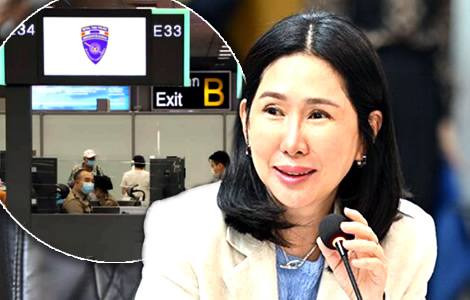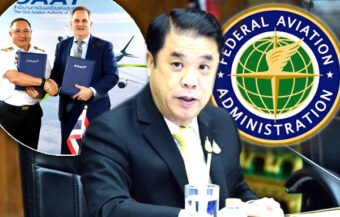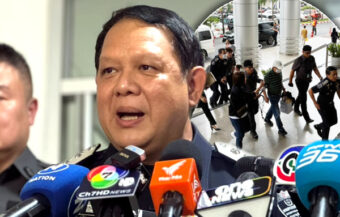Thailand’s new online TM6 form goes live on April 28, 2025, for arrivals from Thursday. Paper forms will still be allowed as a backup. The change aims to streamline entry and improve security, though concerns remain over its impact on tourism and system readiness.
With its foreign tourism industry challenged Thailand is ready for a big change on May 1st. The online TM6 form goes live on Sunday, April 28th, and must be used by passengers arriving from Thursday. Certainly, Police Chief General Kittirat Phanphet on Saturday praised the move as a boon for stronger security screening of undesirables. However, on Sunday, the Permanent Secretary at the Ministry of Tourism and Sports announced that paper TM6 forms will be available for those who failed to register before arrival in Thailand. Nonetheless, this will only be a temporary measure.

Thailand will require all foreign travellers to complete the TM.6 immigration form online from May 1st, 2025. Visitors must fill out the form at least three days before arriving. Officials say the move will speed up entry and improve immigration security.
Ms. Natthriya Thaweevong, Permanent Secretary of the Ministry of Tourism and Sports, confirmed the new rule on April 26, 2025. She explained that Thailand is launching the Thailand Digital Arrival Card (TDAC) and the online TM.6 system.
These new systems will replace the old paper-based TM.6 forms at airports and land borders. Travellers can submit their information electronically through https://tdac.immigration.go.th.
New online TM 6 and TDAC system launched to replace paper immigration forms and speed up tourist entry
Importantly, by filling out the form online, visitors can avoid delays after landing.
However, officials admit that during the first phase, paper forms will still be available as a backup. If the system fails or travellers forget to register, immigration staff will offer paper forms at checkpoints.
Despite assurances, Ms. Natthriya appeared to open the door to the return of full paper-based TM.6 processing. However, the top official stressed that paper options are only temporary, though, until the online system proves fully stable.
Already, there is growing concern about the system’s readiness. Many wonder if tourists will comply with the online requirement. Moreover, there are real fears that the extra burden could worsen Thailand’s fragile tourism recovery.
Tourism numbers are already under pressure from global economic issues and regional competition. Now, with a major immigration rule change, some in the industry fear a sharp downturn in arrivals.
New online registration raises fears over impact on already pressured tourism industry amid challenges
At the same time, Thailand faces mounting security risks. Officials have linked these challenges to a surge in long-stay visa holders overstaying or abusing permits.
Because of this, the government has moved to tighten entry processes and step up checks on foreigners. The Cabinet has additionally ordered a reversal of the July 2024 long visa initiative for 93 countries. It now wants short visa stays. A study by the Ministry of Tourism and Sports has been ordered.
However, this hardline stance is splitting the tourism industry. Some operators support stricter controls, believing they will filter out problematic visitors. Others, especially high-end resort owners, warn the new policy of short visa stays is a “calamitous mistake.”
Among the critics is Mr. Krip Rojanastien, Chairman of Chiva-Som International Health Resorts. This week, he called for Thailand to extend tourist visa stays rather than making travel harder for high-spending guests. Of course, these longer visas should be targeted at the appropriate countries.
Tourism industry split over visa restrictions as fears grow about fallout for high-end visitor spending market
In his view, Thailand should target longer-staying, wealthier visitors from Europe, Australia, and the Americas. Indeed, many now argue that longer visas should be reserved for those with higher spending power.
At the start of the week, Ms. Natthriya also urged a shift in Thailand’s tourism strategy. Notably, she argued that Thailand should stop chasing the Chinese mass market for now.
Despite this, at government meetings, some operators still pushed for more subsidies for Chinese flights. They called for a new marketing campaign targeting second-tier Chinese cities with discounted package tours.
Meanwhile, eagle-eyed expats in Thailand have flagged a serious issue with the TDAC system itself. The online TM.6 form previously did not allow expats or long-stay residents to record their status properly.
In brief, they were unable register as being resident in Thailand. Officials promised that this problem would be fixed by April 28th when it went live.
Later, on Monday, it was found that this issue had indeed been rectified.
Calls grow to shift tourism strategy towards wealthier markets as flaws found in the new TDAC system
Nevertheless, many are sceptical that the system will be ready in time. The Immigration Bureau has therefore scrambled to set up manual processing for anyone who cannot use the online form.
Previously, Thailand scrapped the TM.6 card requirement entirely on April 30, 2024. Before this, paper forms were simply warehoused, never fully digitalised, and largely forgotten.
Now, with the revival of TM.6, immigration officers will need to manually enter details from any paper forms used. This is a concern. The fear is it may create bottlenecks and headaches at busy airports like Suvarnabhumi and Phuket.
Nonetheless, authorities insist that the TDAC system will improve accuracy and tighten security checks. They argue it will allow data-sharing between immigration police and security agencies in real-time.
In theory, smoother processing will allow genuine tourists to enter Thailand faster while keeping out criminals. For example, police will now need to screen all passengers before they land.
Fears of bottlenecks grow as TDAC rollout struggles while officials promise real-time police security screening
On Saturday, National Police Commissioner General Kittirat Phanphet outlined new procedures for early passenger vetting. He said police will link the systems to the Thai immigration database.
At the same time, police were receiving assistance from Chinese authorities via their embassy in Bangkok. This may be extended to other countries also. Of course, all Interpol’s wanted lists will be checked.
This could alert Thai officials to any undesirable individuals before they reach Thai soil. Furthermore, incoming passenger lists will now be cross-checked against Thailand’s internal blacklist. Police will also flag individuals previously convicted of crimes inside the Kingdom.
While the goals are clear, the success of this sweeping immigration overhaul remains highly uncertain.
Early vetting and blacklist checks to boost border security but doubts persist about immigration system success
If the system works, Thailand may well improve border security and visitor management, which has been found wanting this year. Certainly, on Saturday, General Kittirat himself accepted this.
The danger is that the system causes more confusion. This would deepen the country’s tourism woes by putting off visitors shy of inconvenience.
Tourism chief targets European tourists in the second half of 2025 while cabinet orders shorter visas for holidaymakers
Last calls for travellers to be prepared for the Digital Entry Card (TDAC) entry system from May 1st
Access the new Thailand Digital Entry Card (TDAC) system here
New online TM 6 forms to be filled up by all travellers to Thailand starting from May 1st to bolster security
On the other hand, the system must be fully complied with by every person who enters the country. Certainly, without a digital entry for every visitor, the system will not be viable.
What will happen if people enter on paper TM.6 cards which are not entered into the system remains a key concern.
Join the Thai News forum, follow Thai Examiner on Facebook here
Receive all our stories as they come out on Telegram here
Follow Thai Examiner here
Further reading:
Thaksin does not rule out joining talks in US as Thai team finalises plans. They fly out on Thursday
Trump’s remaking of World trade, if it works, will force Thailand to decide between the US and China
US offers a 90-day tariff pause but Thailand must move faster as it already faces shaved GDP in 2025
PM addresses the nation in shock over last week’s earthquake and this week’s Trump tariff bombshell
Finance Minister to travel to US to import more US food and motorbikes while lowering Thai tariffs


















